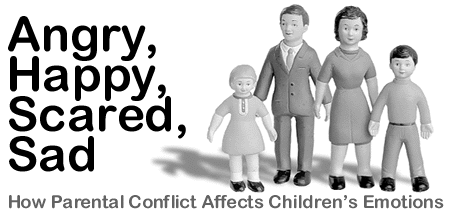
by Kim Anderson
Is it good for children to see their parents fight? Ask any parent and the knee-jerk response is no. But is it healthy for children never to witness conflict? What do children actually feel when their parents argue with them or with each other? How do children explain and deal with those feelings?
 |
| The children in Silverman's study use these rubber dolls to tell stories. |
These are questions that Paul Silverman, professor of developmental psychology at The University of Montana, is attempting to answer in a new study on how parental conflict affects a child’s understanding of emotions and how this understanding affects his or her psychological adjustment. When Silverman’s study is completed about a year from now, he hopes to have information that could result in new models of parent training and family and individual psychotherapy.
“There’s been a good deal of study on the development of children’s emotional understanding and how this interacts with their psychological adjustment,” Silverman says. “But there’s been very little research on the relationship between aspects of family life-like arguing-and the child’s emotional understanding and coping.”
Silverman’s background has uniquely prepared him for this kind of research. After working as a developmental psychologist, doing research and teaching, Silverman retrained as a clinical child psychologist.
“I’m interested in the normal developmental processes-the area developmental psychologists primarily study-but also in children’s individual psychological adjustments,” Silverman says. “In the past fifteen years there’s been a confluence in these areas of thinking, and that’s the area I’m interested in working in.”
Measuring Emotions
Silverman and his assistants plan to interview about 100 families. Each interview includes a self-reporting form that asks parents about their child’s overall psychological adjustment and their income, education and children’s birth order. Parents also are asked to describe the frequency and intensity of their discussions and rate the intensity of their expressed emotions. Children are given a brief questionnaire asking them how they perceive their parents’ relationship and a vocabulary test designed to indicate IQ.
But the interviews with the six- and seven-year-old children are the crux of the study. “Children’s understanding of emotions changes with age,” Silverman says. “A very young child is capable of feeling many emotions but does not have the equipment to understand those feelings. The reason we’re concentrating on six- and seven-year-olds is that, at this age, children begin to have an understanding of their emotions and can be aware of having several different emotions at once.”
 |
| This picture was drawn by the author's ten-year-old daugher, Isabelle. |
In the interviews Silverman relies on several handy low-tech tools and storytelling. Silverman tells a child a story about a family conflict involving parents and a child. “In these stories the child is in triangulation with the parents and there are conflicting emotions,” Silverman explains. “A typical story might involve a seven-year-old girl who wants candy before dinner. Dad says no. Mom says ‘Oh, a little candy won’t hurt you. Maybe if we ask Daddy nicely he’ll change his mind.’ Then Dad expresses anger at Mom.”
Silverman asks the child to use the feelings frame-a homemade wooden abacus-like structure which features beads with faces looking mad, happy, sad, scared and loving-to describe the feelings of the boy or girl in the story. “The child can use the feelings frame to move the faces,” Silverman says. “Let’s say the happy face is moved halfway up the scale and maybe the scared face is moved up as well. We also ask the kids, ‘What happens next?’ in an effort to determine the child’s understanding and coping levels. And we ask the children if these things happen in their family.”
Another handy tool in the interviews is a set of small rubber dolls that represent a nuclear family straight out of Dick and Jane-mom, dad, brother and sister. Silverman uses the dolls as he tells his stories and the children can manipulate them as they tell their own stories.
“We’re particularly looking for stories that contain conflicting feelings,” Silverman says. “We ask children to tell us about a time when they felt happy and sad at the same time. We talk about how it feels to have more than one feeling at a time and what an outcome might be. We ask them, ‘Does one feeling change the other feeling?’”
Once the data is collected, the parent and child responses are coded-a laborious process-and then entered into a computer, which spots patterns in stories. “This sort of research was impossible to do as recently as ten years ago because of the hours involved,” Silverman says. “Now it takes months to collect the data, weeks to enter it into the computer and then minutes to get the analysis.”
Is Conflict Healthy or Harmful?
Silverman doesn’t believe that all family conflict is detrimental to children. Instead he suspects that some family discord can contribute, in a healthy way, to a child’s psychological development. Analysis of the data collected and entered so far seems to bear this out.
 |
| Children interviewed by Silverman use the feelings frame (left) to describe theiremotions. |
“Some degree of conflict can be healthy in that it helps children recognize and understand angry emotions,” Silverman says. “That’s how we model working out problems. But what happens to a child’s psychological development when the arousal level gets too high for their coping skills?” Other research has shown, he says, that “hot” or intense emotional climates within families and lots of parent-parent and parent-child conflict can play important roles in the development of psychological disorders in children.
The nature of the conflict also makes a difference. “When parents argue about the child in front of the child, that can be damaging,” Silverman says. “When parents argue in ways that are demeaning and purposefully hurtful, that certainly will have a different effect than calmer, more impersonal disagreements.”
The Envelope Please
Results from the first fifty interviews support Silverman’s hypotheses that the kind and degree of emotional conflict within families affects a child’s emotional understanding and psychological adjustment.
“We’re finding that children who are depressed and anxious are influenced by the frequency with which their parents discuss issues. These children also perceive a threat from parental discord,” Silverman says. “These variables generally predict adjustment problems.”
Initial results indicate that a child’s understanding of conflicting feelings can moderate anxiety and mitigate the negative effects of discord. The frequency with which parents argue also contributes to the child’s understanding of conflicting emotion. Children who witness some parental discord are more sophisticated about handling conflicting emotions, and, conversely, children who have a better understanding of conflicting emotions are better able to handle parental disagreement.
Silverman cautions, however, that the families in the study so far experience low to moderate levels of conflict. “What we predict, but don’t know, is that children who are exposed to high levels of parental conflict experience adjustment problems and decreased levels of understanding,” he says.
Silverman says he is planning to collect additional information on families that experience a much higher level of conflict. Past research has shown, he says, that when the emotions of adults and children are highly aroused, their ability to process information is compromised. “We expect that the children who are frequently exposed to high levels of parental conflict experience high arousal levels and can’t really figure out what’s happening at an emotional level.”
The Next Step
If future research confirms Silverman’s initial findings, he believes that several new therapeutic approaches might be developed to help children and their families. One approach would be to work with families, especially parents, to reduce parental strife in high-conflict families. Another would be to teach children directly about conflicting emotions, because their understanding acts as a buffer to the effects of family conflict.
“This work is exciting to me on many levels,” Silverman says. “And I believe that what we’ll learn will be valuable and useful. All families argue. If I can contribute to an understanding of what that arguing does to children’s emotional understanding and psychological adjustment, I’ll be happy.” M
Kim Anderson is the administrator for the Missoula Writing Collaborative.![]()